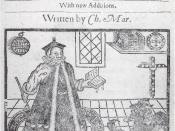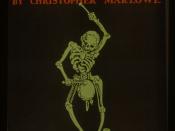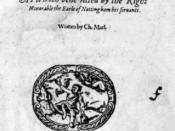Doctor Faustus - the Elizabethan version of the morality play
Although Christopher Marlowe's fame was somewhat obscured by his contemporary William Shakespeare, he is regarded as one of the greatest dramatists in English Renaissance. His best-loved work is The Tragical History of the Life and Death of Doctor Faustus, a tragedy who tackles the medieval genre of the morality play in a new and unexpected way.
In the medieval morality play the forces of good and evil compete for the soul of an everyman figure, who by the end is redeemed. In his modernized Elizabethan take on the genre, Marlowe is experimenting with these older forms, playing tricks on audience by subverting their expectations.
Marlowe's everyman is Doctor Faustus - symbol of the medieval scholar. In an age of reason, but still heavily dominated by religion and superstition, even learned man dabbled with alchemy and other sorts of pseudo-sciences or "magic" in an attempt to surpass their human limitation.
For example Doctor Faustus turns to black magic because he has reached the end of every subject he has studied. He appreciates Logic as being a tool for arguing; Medicine as being unvalued unless it allowed raising the dead and immortality; Law as being upstanding and above him; Divinity as useless because he feels that all humans commit sin, and thus to have sins punishable by death complicates the logic of Divinity.
Unlike the medieval morality play, the center character of this play is no longer a character whose sin is upholding values but one with the desire to be god-like to the point of denying God's very existence. For all his scholarship, Faustus oscillates throughout the play, constantly contradicting himself. He denies the existence of God. Belief in God is a "vain fancy", yet he talks repeatedly of God;...


